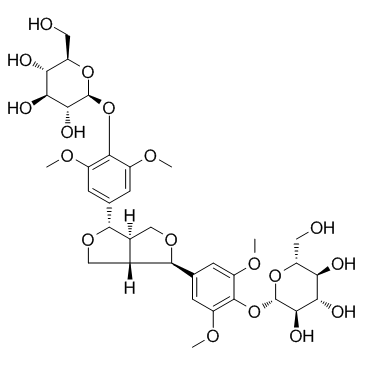In vivo anti-inflammatory and antinociceptive effects of liriodendrin isolated from the stem bark of Acanthopanax senticosus.
Hyun-Ju Jung, Hee-Juhn Park, Ryung-Gue Kim, Kyoung-Min Shin, Joohun Ha, Jong-Won Choi, Hyoung Ja Kim, Yong Sup Lee, Kyung-Tae Lee
文献索引:Planta Med. 69(7) , 610-6, (2003)
全文:HTML全文
摘要
In the present study, liriodendrin isolated by activity-guided fractionation from the ethyl acetate (EtOAc) extracts of the stem bark of Acanthopanax senticosus, was evaluated for anti-inflammatory and antinociceptive activities. Liriodendrin (5, 10 mg/kg/day, p. o.) significantly inhibited the increase of vascular permeability induced by acetic acid in mice and reduced an acute paw edema induced by carrageenan in rats. When the analgesic activity was measured by the acetic acid-induced writhing test and hot plate test, liriodendrin showed a dose-dependent inhibition in animal models. In addition, syringaresinol, the hydrolysate of liriodendrin, more potently inhibited the LPS-induced production of NO, PGE 2 and TNF-alpha production of macrophages than liriodendrin. Consistent with these observations, the expression level of iNOS and COX-2 enzyme was decreased by syringaresinol in a concentration-dependent manner. These results suggest that the anti-inflammatory and antinociceptive effects of liriodendrin after oral administration were attributable to the in vivo transformation to syringaresinol, which may function as the active constituent.
相关化合物
| 结构式 | 名称/CAS号 | 分子式 | 全部文献 |
|---|---|---|---|
 |
刺五加苷 E
CAS:39432-56-9 |
C34H46O18 |
|
[Studies on chemical constituents from stem barks of Fraxinu...
2008-08-01 [Zhongguo Zhong Yao Za Zhi 33(16) , 1990-3, (2008)] |
|
[Chemical constituents from flowers of Chrysanthemum indicum...
2010-03-01 [Zhongguo Zhong Yao Za Zhi 35(6) , 718-21, (2010)] |
|
[Studies on phenylpropanoids from herbs of Eriophyton wallic...
2008-11-01 [Zhongguo Zhong Yao Za Zhi 33(22) , 2636-9, (2008)] |
|
[Chemical constituents of Acanthopanax giraldii Harms].
1991-07-01 [Zhongguo Zhong Yao Za Zhi 16(7) , 421-4, 448, (1991)] |
|
[Studies on chemical constituents of Syringa veutina].
2008-05-01 [Zhong Yao Cai 31(5) , 679-81, (2008)] |